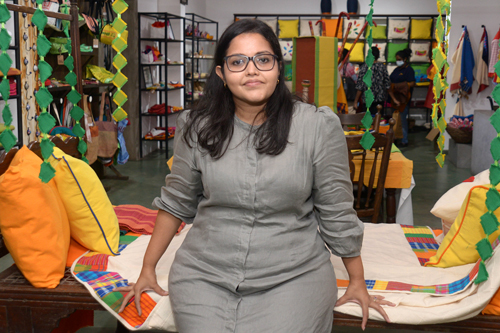Taking handloom to luxury markets overseas

Selyna Peiris: Constantly innovating at Selyn Pic by Eshan Fernando
The words ‘fair-trade’ were not part of the business lexicon ten years ago when Selyna Peiris first joined the handloom company that her mother had built, after graduating from the Sri Lanka Law College as an attorney-at-law. “I remember people used to tell me ‘What are you doing, people want to see handloom, they don’t want to know of your values’. But times are changing – this is what I mean by innovation and that is the kind of journey Selyn is taking to the future as well.”
Started as a home business by Sandra Wanduragala in Kurunegala 31 years ago with 15 weavers working out of her garage, the handloom handicrafts company, Selyn, has over 1000 artisans in their network at present. “Innovation has a role to play in tradition. In order for that tradition to last and be taken from generation to generation, it has to meet the needs and trends of the present day,” says Selyna who took over the reins from her mother in 2013.
After completing her LLM with the University College of London Selyna pursued a Masters in Advanced International Studies – International Relations and Affairs at the Diplomatic Academy of Vienna. Returning to Sri Lanka following the end of the conflict in 2009, she worked as a consultant for the United Nations Industrial Development Organization focusing on women’s livelihoods in the Eastern Province. This work helped her to understand the plight of the women living in these areas and the gaps which needed to be addressed.
Her mother was able to steer Selyn towards an export market by focusing on handloom toys and expanding with retail shops offering products ranging from kaleidoscopic sarees, sarongs and shirts, to colourful crafts, jewellery and more. Her key innovation was the consolidation of fair-trade practices which made Selyn Sri Lanka’s only fair-trade certified handicrafts company.
With a workforce made up of 90% women – artisans from across Sri Lanka, the majority from Kurunegala and others from Gampaha and Batticaloa, as well as rush and reed workers from Vavuniya and Bentota and embroiders from Nuwara Eliya and Mannar, their social business model that enables women to work from their homes in a flexible manner has been a major advantage.
“We give them a working model that enables them to really balance their life because in a Sri Lankan cultural context it doesn’t have to be in a rural area, there are plenty of graduates who have dropped out because they have children,” Selyna points out. A mother herself, she understands the importance of that kind of support. “For women to be economically engaged in our country, businesses need to be able to give them the flexibility to balance their life and their work”
Following the outbreak of the COVID-19 pandemic, Selyn was able to remain in operation as their home-based model allowed artisans to continue work while under lockdown. Protecting their people was priority number one as they did not let artisans go and did their best to assist those who didn’t have any work with an allowance. “We weren’t perfect but we made that genuine attempt,” says Selyna. However, the business has been affected significantly with the current economic crisis and power cuts. Since they import raw materials such as dyes, chemicals and yarns, the cost of these materials rocketing up by 46% has impacted them heavily.
However, Selyna has hope that their newest endeavour Selyn Textiles will provide some respite. With no premium available for handloom goods in the international market, Selyn Textiles aims to export handloom fabrics to luxury markets as a premium artisanal craft product. “That is where the longevity of handloom industry lies,” says Selyna, explaining that a fabric usually sold for 5 USD can be valued up to 20 USD as a premium product.
The business model will be launched in the UK where Selyn has also secured collaborations with the University of the Arts London and the London College of Fashion as part of their strategy to reposition handloom in the international market.
By working with undergraduate designers and familiarizing them with Sri Lankan handloom she feels the exposure of handloom products overseas will increase. “If you look at the crafts in our country, they’re very different. They have this raw authentic feeling and are very contemporary – I think that contemporary form can be taken to the world and really valued,” Selyna says.
A novel addition is the introduction of blockchain technology into their supply chains. Selyna explains that blockchain technology is a database system used to maintain secure records of transactions whereby customers can scan Quick Response (QR) codes printed on their items after purchase to find out which artisan was responsible for making that particular item and if they received compensation on time. By employing this technology, she hopes the company can go beyond the label of being a fair-trade certified company and ‘seek true transparency so that there can be greater justice in the supply chains’.
Searching for an ideal partner? Find your soul mate on Hitad.lk, Sri Lanka's favourite marriage proposals page. With Hitad.lk matrimonial advertisements you have access to thousands of ads from potential suitors who are looking for someone just like you.


